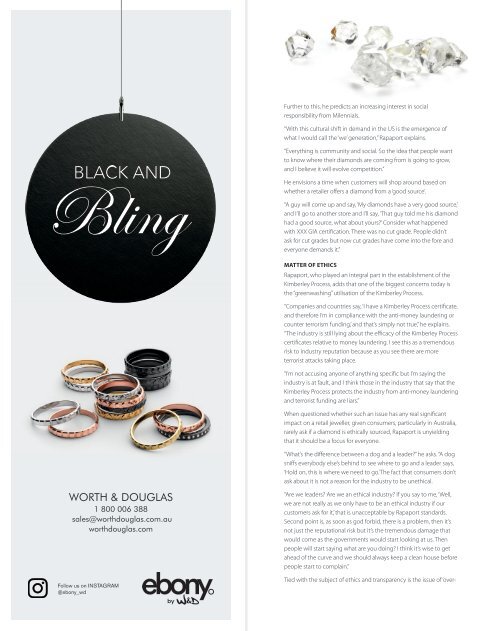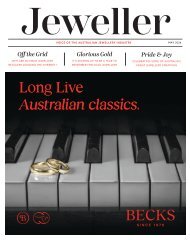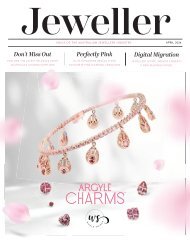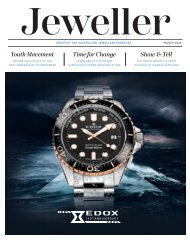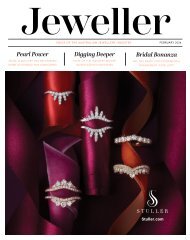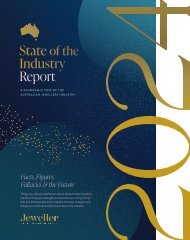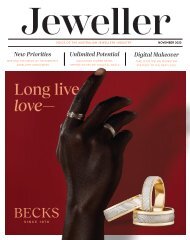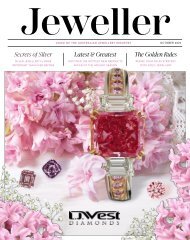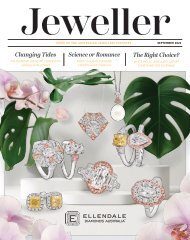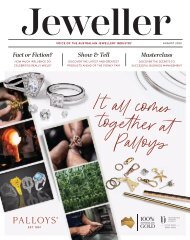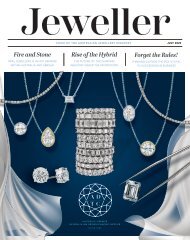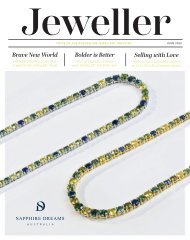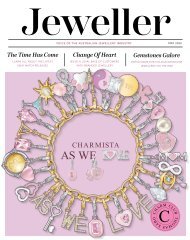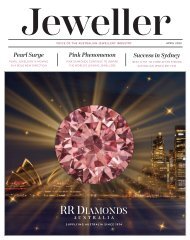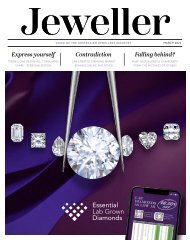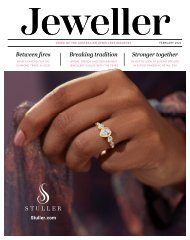You also want an ePaper? Increase the reach of your titles
YUMPU automatically turns print PDFs into web optimized ePapers that Google loves.
Further to this, he predicts an increasing interest in social<br />
responsibility from Milennials.<br />
“With this cultural shift in demand in the US is the emergence of<br />
what I would call the ‘we’ generation,” Rapaport explains.<br />
“Everything is community and social. So the idea that people want<br />
to know where their diamonds are coming from is going to grow,<br />
and I believe it will evolve competition.”<br />
He envisions a time when customers will shop around based on<br />
whether a retailer offers a diamond from a ‘good source’.<br />
“A guy will come up and say, ‘My diamonds have a very good source,’<br />
and I’ll go to another store and I’ll say, ‘That guy told me his diamond<br />
had a good source, what about yours?’ Consider what happened<br />
with XXX GIA certification. There was no cut grade. People didn’t<br />
ask for cut grades but now cut grades have come into the fore and<br />
everyone demands it.”<br />
MATTER OF ETHICS<br />
Rapaport, who played an integral part in the establishment of the<br />
Kimberley Process, adds that one of the biggest concerns today is<br />
the “greenwashing” utilisation of the Kimberley Process.<br />
“Companies and countries say, ‘I have a Kimberley Process certificate,<br />
and therefore I’m in compliance with the anti-money laundering or<br />
counter terrorism funding,’ and that’s simply not true,” he explains.<br />
“The industry is still lying about the efficacy of the Kimberley Process<br />
certificates relative to money laundering. I see this as a tremendous<br />
risk to industry reputation because as you see there are more<br />
terrorist attacks taking place.<br />
“I’m not accusing anyone of anything specific but I’m saying the<br />
industry is at fault, and I think those in the industry that say that the<br />
Kimberley Process protects the industry from anti-money laundering<br />
and terrorist funding are liars.”<br />
When questioned whether such an issue has any real significant<br />
impact on a retail jeweller, given consumers, particularly in Australia,<br />
rarely ask if a diamond is ethically sourced, Rapaport is unyielding<br />
that it should be a focus for everyone.<br />
“What’s the difference between a dog and a leader?” he asks. “A dog<br />
sniffs everybody else’s behind to see where to go and a leader says,<br />
‘Hold on, this is where we need to go.’ The fact that consumers don’t<br />
ask about it is not a reason for the industry to be unethical.<br />
WORTH & DOUGLAS<br />
1 800 006 388<br />
sales@worthdouglas.com.au<br />
worthdouglas.com<br />
Follow us on INSTAGRAM<br />
@ebony_wd<br />
“Are we leaders? Are we an ethical industry? If you say to me, ‘Well,<br />
we are not really as we only have to be an ethical industry if our<br />
customers ask for it,’ that is unacceptable by Rapaport standards.<br />
Second point is, as soon as god forbid, there is a problem, then it’s<br />
not just the reputational risk but it’s the tremendous damage that<br />
would come as the governments would start looking at us. Then<br />
people will start saying what are you doing? I think it’s wise to get<br />
ahead of the curve and we should always keep a clean house before<br />
people start to complain.”<br />
Tied with the subject of ethics and transparency is the issue of ‘over-


